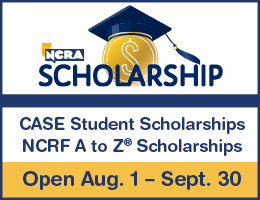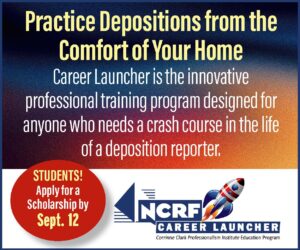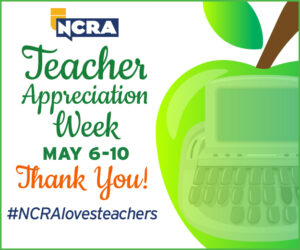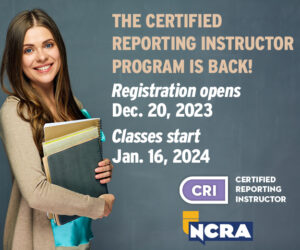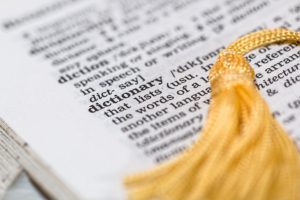By Josée Boisvert
As the approaches and methodologies applied to instruction and teaching have evolved over the centuries, so too have the challenges. Students today are very different than they were a century ago, or even 20 years ago. Cultural and socio-economic diversity, a rapidly evolving job market, and ever-changing technological advances continue to shape the teaching environment, its institutions, clients, and students.
As a parliamentary reporting teacher, this prompts me to reflect on the attributes I must possess as an instructor in order to adapt to the evolution of various societal aspects and to achieve my ultimate goal: delivering exceptional instruction to aspiring parliamentary reporters.
First and foremost, we expect our teachers to be knowledgeable in the subjects they are teaching and to have acquired the ability to properly plan and structure course delivery. I will therefore strive to be adequately prepared for every course by devising clear learning outcomes, such as speeds to be attained, which will be structured into parts, and supported by the appropriate delivery methods and a variety of resources. Assessment activities, such as assignments, realtime practice, and tests will also be planned to ensure that students are achieving their learning goals. By preparing a detailed syllabus for the course, stating the course outcomes, the resources to be used, and the required assignments, along with session plans and rubrics, I will be more likely to produce concrete learning results for my students as they progress towards their targeted speeds and conflict resolution.
In addition, these tools and strategies play an important role in communicating essential course information to students. A teacher’s ability to communicate effectively with her students is key. For example, by sharing the course syllabus with my students and discussing it with them, I will give them the opportunity to reflect on the learning outcomes, to preview the resources I plan to use, to prepare for assignments according to the course structure, and to understand how they will be assessed and what is expected of them. Providing them with immediate feedback, for example, after dictation practice and readback, will also help ensure that they stay on track at critical steps of the course.
Communication, however, is not a one-way activity. To become an exceptional instructor, I will need to listen to my students and tune into their world. Performing a class survey at the beginning of a session will help me assess the knowledge level of the students and determine possible gaps in theory application, gain insight into their areas of interest, or identify obstacles they might be facing individually, whether they are struggling with speed levels or with specific theory notions. Another effective way for me to gain valuable information and plan next steps will be to obtain their feedback regularly, with the help of tools such as the One-Minute Paper, where students are asked to list an important element they have learned in a class and what notions were lacking.
Of course, the logical consequence of establishing meaningful means of communicating with my students is the necessity to adapt my teaching methods to their needs, interests, goals, and expectations. Adaptability, for a teacher, means that I must strive to create learner-centered courses that will take into account students’ communication preferences to devise activities that will promote their participation in class, as well as in other learning activities, such as projects, tests, and field work. Giving students the opportunity to work in groups on reflective assignments will appeal to learners who are more at ease with social and verbal interaction, while setting aside time for practice and speed contests will motivate kinesthetic students.
I will also aim to offer them a choice of activities according to their individual or group learning styles, and provide them with authentic and relevant context that will foster their ability to retain information, to apply what they have learned in real-life situations, and to achieve higher-order thinking. For example, a field trip to the Senate Chamber will give my students a glimpse of the environment they will be working in. It will reinforce the importance of achieving a conflict-free method and will hopefully motivate them to persevere to acquire realtime and captioning skills.
Adapting to ever-evolving technology will also prove an asset in delivering instruction to students and promoting learning in a modern environment. Both in and outside the classroom, I will tap into the wealth of resources offered by the Web and online applications, whether to provide supplementary reading and practice material, research activities, quizzing and testing opportunities, or to take advantage of more effective means of communication, such as blogs, online discussion groups, or bulletin boards.
Last but not least, drawing from a variety of resources, tools, and activities will also help me create a more dynamic and engaging learning environment for my students. Undoubtedly, making efforts to engage students in their learning and to help them achieve their learning goals can yield rich dividends. As an instructor, I can engage students by incorporating variety in all aspects of teaching. I will plan a mix of instructor-led and instructor-facilitated activities, such as demonstrations and class discussions, or field work and group work that will give students an opportunity to learn according to their preferred styles. Inviting a guest speaker who works in a related field to attend class and read dictation will help challenge students and allow them to learn more about their future working environment. I will also offer them an assortment of textbook, Web, and media resources appropriate to the chosen topics and learning activities, and I will vary the tools used to assess their progress, by offering both cognitive and performance-based tests, such as papers and written exams or quizzes and speed tests. Finally, I believe that by creating a positive and respectful environment, while setting high expectations of students, I will be able to motivate them to persevere in attaining their goals.
Notwithstanding these far-reaching goals and best intentions, the quest to become an exceptional instructor must include a self-assessment strategy. Drawing from the results obtained by my students, their evaluation of the course, and the analysis of my peers, I will strive to adapt and improve my courses as I move forward in my teaching career, with the aspiration of lighting the fire of learning in the heart of every parliamentary reporting student.
Josée Boisvert can be reached at Josee.boisvert@sen.parl.gc.ca. This article was written as part of the requirements for NCRA’s CRI course.
